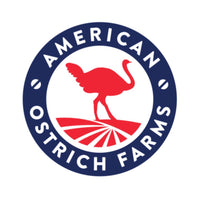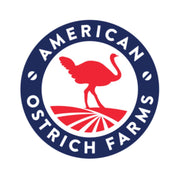WHAT IS THE HEALTHIEST RED MEAT?
There are a lot of factors that contribute to any food's health benefits and risks, including fat-to-protein ratio, nutrient density, digestibility, and - when it comes to animal proteins - the animal's diet and the part/s consumed. Red meat often gets a bad rap, due to clinical studies linking overconsumption to health issues such as heart disease, type 2 diabetes, and certain cancers. It's important to understand, however, that not all red meats are created equally, and as with anything, moderation is key.
One of the reasons ostrich is widely considered a healthier meat than beef or pork is its comparatively low fat content. Plus, the fat found in ostrich meat is primarily unsaturated. Unsaturated fat is considered beneficial fat that can actually improve blood cholesterol levels, ease inflammation, and help to stabilize heart rhythms. While all animal proteins contain some amount of saturated fat (the type that can build up in your blood vessels), a portion of ostrich contains only about 10% of the recommended daily value of saturated fat, whereas the same size portion of beef generally contains more than 35% of the daily recommended value.
Fat content is just one aspect of the nutritional profile of ostrich, and we are often asked how it compares to beef, bison, wild game like deer and elk, as well as other forms of poultry, including turkey and duck. This article breaks down those questions and helps explain why ostrich is a uniquely healthy red meat.
IS OSTRICH MEAT HEALTHY
The first things people think of when adopting a healthier lifestyle are fat content, protein intake, sodium, and cholesterol. Most assume that all red meats have higher fat content, and that they need to stick to a strict “turkey, rice and broccoli” diet in order to eat clean and healthy. As we learned above, that's simply not the case. Ostrich meat is a very lean red meat with lower saturated fat than beef, deer and even many forms of poultry. Ostrich contains more protein than these other options, and is an excellent source of potassium, selenium, B vitamins, iron, and more.
WHICH MEAT HAS THE BEST PROTEIN FOR MUSCLE GROWTH?
Let’s start with the most commonly discussed topic in foods when you’re wanting to make the switch to healthier living: protein. Protein helps your body repair and generate new cells. Protein is also important for growth and development in children, teens, and pregnant women. This nutrient plays a critical role in the processes that fuel energy production and in the regulation of the immune system. Major protein deficiency can cause swelling, skin degeneration, muscle loss, and stunt growth in children. Ostrich meat provides 20g of protein per 100g, as opposed to the 17g in beef. Because the ostrich is not a mammal, it's more readily digestible than mammalian proteins.
WHICH MEAT IS HIGHEST IN IRON?
Iron is another commonly discussed nutritional component in foods. We know iron is important, but why? Iron deficiency can lead to anemia, which causes extreme fatigue, chest pain, fast heartbeat or shortness of breath, headache, dizziness, as well as poor blood circulation. Iron is critical for the transport of oxygen throughout the body, as well as the synthesis of DNA. Ostrich meat is packed with more iron than beef or even turkey! In a direct comparison, ostrich contains 2.9g of iron, beef contains 2g, and turkey contains only 1.5g.
IS SODIUM IN MEAT BAD?
Sodium is an important element of your diet, as this mineral conducts nerve impulses, contracts and relaxes muscles, and maintains the proper balance of water and minerals in your cells. However, according to the American Heart Association (AHA), eating too much sodium can raise your risk of high blood pressure, heart attack, and stroke. The good news is that cutting down on sodium can help lower your blood pressure and keep your heart healthy. AHA recommends you limit your daily sodium intake to 500mg. Luckily, ostrich meat has less sodium than turkey or even deer. Ostrich meat is recommended by the American Diabetes Association.
WHICH MEATS CONTAIN SELENIUM?
If you’re like most Americans, you’re probably wondering, “What’s selenium?” According to Medical News Today, selenium aids in preventing oxidation in the body. Excessive oxidation can cause damage to the cells, impairing their function or even leading to cell death. Ensuring adequate selenium in your diet can help reduce inflammation and the buildup of platelets, as well as reduce the risk of age-related cognitive decline and impairments. Ostrich meat is packed with selenium, with a single portion containing nearly 60% of the daily recommended value. This figure is 28% for beef, and approximately 18% for turkey.






